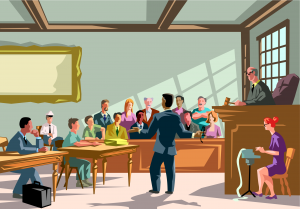Personal injury lawyers are the unsung heroes working diligently behind the scenes to ensure that justice is served and that the rights of the injured are protected.
In the realm of personal injury law, there’s much more than meets the eye. When you think of personal injury lawyers, like personal injury lawyers in Queens, you might envision courtroom dramas and dramatic settlements. However, there’s a hidden world behind the scenes, where these legal professionals work tirelessly to protect your rights, navigate complex legal intricacies, and seek justice on your behalf.
In this revealing exploration, we’ll peel back the curtain and shed light on what personal injury lawyers do for you, showcasing the dedication, expertise, and unwavering commitment that truly defines their role. So, join us on this behind-the-scenes journey as we uncover the vital work that often goes unnoticed but is paramount in ensuring your rights and well-being after an injury.
1. Case Assessment and Client Meeting
The first step in the journey with accident attorneys NY is the initial consultation. This meeting serves as an opportunity for you to share the details of your case with the attorney and for them to evaluate the merits of your claim. During this consultation, the lawyer will listen to your account of the accident or incident that led to your injury, ask questions to gather crucial information, and provide you with an initial assessment of the potential legal options available to you. It’s also a chance for you to ask questions and gain a better understanding of the legal process and what to expect as your case progresses.
2. In-Depth Legal Research and Fact-Finding
Once you’ve retained a personal injury lawyer, the next crucial step is legal research and investigation. Your attorney will delve into the specifics of your case, collecting evidence such as medical records, accident reports, witness statements, and any other pertinent documents. They may also consult with experts in various fields to assess liability and calculate the extent of your damages. This thorough research and investigation phase is essential for building a strong case and establishing a clear understanding of the facts and circumstances surrounding your injury. It enables your attorney to develop a strategic plan for pursuing your claim effectively.
3. Advocating with Insurance Companies
After the initial investigation, personal injury lawyers often engage in negotiations with insurance companies on your behalf. Insurance companies typically represent the at-fault party and are responsible for compensating you for your injuries. Your attorney will present the evidence and documentation gathered during the investigation to the insurance company and advocate for a fair settlement. This negotiation phase can involve back-and-forth discussions as both parties try to reach an agreement. Your lawyer’s experience in handling such negotiations is crucial, as they work to maximize the compensation you receive for medical expenses, lost wages, pain and suffering, and other damages.
4. Initiating Legal Proceedings
If negotiations with the insurance company fail to produce a satisfactory settlement offer, the next step is filing a lawsuit. Your personal injury lawyer will draft a complaint outlining the details of your case and formally initiate the legal proceedings. This initiates the litigation process, and the lawsuit will be served to the at-fault party, who then has a designated timeframe to respond. Filing a lawsuit is a strategic move to leverage the legal system and put additional pressure on the opposing party to come to a fair resolution. It’s important to note that many personal injury cases are ultimately settled before they go to trial, but the lawsuit serves as a necessary step in the pursuit of justice and compensation.
5. Uncovering Evidence through Discovery and Depositions
Once a lawsuit is filed, both parties enter the discovery phase. During this stage, personal injury lawyers exchange information and evidence relevant to the case. Discovery methods may include written interrogatories, requests for documents, and depositions. Depositions are particularly significant, as they involve witnesses, including you and the opposing party, providing sworn testimony under oath. Your attorney will prepare you for your deposition, ensuring you can effectively answer questions while protecting your interests. The deposition process allows both sides to gather additional information, assess the credibility of witnesses, and strengthen their case. It plays a crucial role in shaping the course of the lawsuit.
6. Crafting a Strong Legal Strategy
With the information obtained during discovery, personal injury lawyers continue to build their case. This involves analyzing the evidence, identifying key witnesses, and consulting with experts when necessary. Your attorney will craft legal arguments, develop strategies, and prepare exhibits and presentations that support your side of the story. Building a strong case is essential to persuading the opposing party or the court of the validity of your claims and the extent of your damages. Throughout this phase, your lawyer will also remain in constant communication with you, ensuring you are well-informed about the progress of your case and any developments that may arise during the litigation process.
7. Pursuing Settlement Options Further
While the majority of personal injury cases are settled before reaching the trial stage, settlement negotiations often continue throughout the litigation process. As both parties gather more information and evidence during discovery, new opportunities for negotiation may arise. Your attorney will engage in ongoing discussions with the opposing party, seeking opportunities to reach a fair and favorable settlement. Settlement negotiations can be complex and may involve multiple rounds of offers and counteroffers. Your personal injury lawyer’s goal is to secure the best possible outcome for you, whether through a settlement or, if necessary, by preparing for trial.
8. Preparing for Courtroom Battle
If settlement negotiations prove unsuccessful or if it is determined that going to trial is in your best interest, your personal injury lawyer will shift their focus to trial preparation. This involves extensive preparation of witnesses, finalizing legal arguments, and ensuring that all evidence and exhibits are ready for presentation in court. Your attorney will also work on selecting a jury, if applicable, and preparing opening statements, cross-examinations, and closing arguments. The trial preparation phase is a critical stage that requires careful attention to detail and strategy to present the most compelling case possible when the trial date arrives.
9. Courtroom Litigation and Advocacy

The trial phase is the culmination of the personal injury lawsuit. During the trial, both parties present their cases in front of a judge and, if applicable, a jury. Your personal injury lawyer will use their legal expertise and courtroom skills to advocate for your rights and present the evidence and arguments that support your claims. This can involve calling witnesses, cross-examining opposing witnesses, and presenting documents and exhibits to establish liability and prove the extent of your damages. Trials can vary in length and complexity, but your attorney will guide you through the process, keeping you informed about developments and helping you navigate the courtroom environment. The ultimate goal at trial is to secure a favorable verdict that compensates you for your injuries and losses.
10. Addressing Post-Trial Issues and Appeals
After a trial concludes, there are several post-trial matters that may arise. If the verdict is in your favor, your personal injury lawyer will work on the collection of the awarded damages from the opposing party. If the verdict is unfavorable, your attorney may explore options for appealing the decision, depending on the circumstances. Additionally, there could be post-trial motions and hearings related to issues such as legal fees, costs, or other unresolved matters. Your attorney will continue to represent your interests during these proceedings and guide you through any necessary steps to finalize the case. The post-trial phase is essential for ensuring that justice is served and that you receive the compensation to which you are entitled.
Conclusion
Personal injury lawyers are the unsung heroes working diligently behind the scenes to ensure that justice is served and that the rights of the injured are protected. They navigate the complex legal system, investigate cases, negotiate with insurance companies, and ultimately fight for their clients’ rights to fair compensation. Their dedication and expertise make a world of difference for individuals facing the physical, emotional, and financial challenges of personal injury. So, the next time you find yourself in need of their services, remember that personal injury lawyers are here to support you, advocate for you, and provide you with the peace of mind you deserve during difficult times.


Join the conversation!